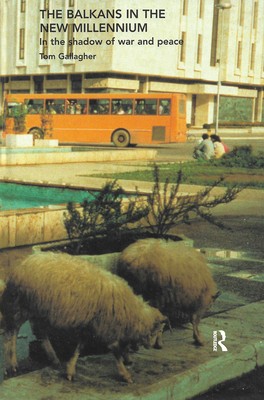
- We will send in 10–14 business days.
- Author: Tom Gallagher
- Publisher: Routledge
- ISBN-10: 0415349400
- ISBN-13: 9780415349406
- Format: 16.5 x 23.6 x 2 cm, hardcover
- Language: English
- SAVE -10% with code: EXTRA
Reviews
Description
Can the Balkans ever become a peaceful peninsula like that of Scandinavia? With enlightened backing, can it ever make common cause with the rest of Europe rather than being an arena of periodic conflicts, political misrule, and economic misery?
In the last years of the twentieth century, Western states watched with alarm as a wave of conflicts swept over much of the Balkans. Ethno-nationalist disputes, often stoked by unprincipled leaders, plunged Yugoslavia into bloody warfare. Romania, Bulgaria and Albania struggled to find stability as they reeled from the collapse of the communist social system and even Greece became embroiled in the Yugoslav tragedy.
This new book examines the politics and international relations of the Balkans during a decade of mounting external involvement in its affairs. Tom Gallagher asks what evidence there is that key lessons have been learned and applied as trans-Atlantic engagement with Balkan problems enters its second decade. This book identifies new problems: organized crime, demographic crises of different kinds, and the collapse of a strong employment base. This is an excellent contribution to our understanding of the area.
EXTRA 10 % discount with code: EXTRA
The promotion ends in 14d.17:25:40
The discount code is valid when purchasing from 10 €. Discounts do not stack.
- Author: Tom Gallagher
- Publisher: Routledge
- ISBN-10: 0415349400
- ISBN-13: 9780415349406
- Format: 16.5 x 23.6 x 2 cm, hardcover
- Language: English English
Can the Balkans ever become a peaceful peninsula like that of Scandinavia? With enlightened backing, can it ever make common cause with the rest of Europe rather than being an arena of periodic conflicts, political misrule, and economic misery?
In the last years of the twentieth century, Western states watched with alarm as a wave of conflicts swept over much of the Balkans. Ethno-nationalist disputes, often stoked by unprincipled leaders, plunged Yugoslavia into bloody warfare. Romania, Bulgaria and Albania struggled to find stability as they reeled from the collapse of the communist social system and even Greece became embroiled in the Yugoslav tragedy.
This new book examines the politics and international relations of the Balkans during a decade of mounting external involvement in its affairs. Tom Gallagher asks what evidence there is that key lessons have been learned and applied as trans-Atlantic engagement with Balkan problems enters its second decade. This book identifies new problems: organized crime, demographic crises of different kinds, and the collapse of a strong employment base. This is an excellent contribution to our understanding of the area.


Reviews